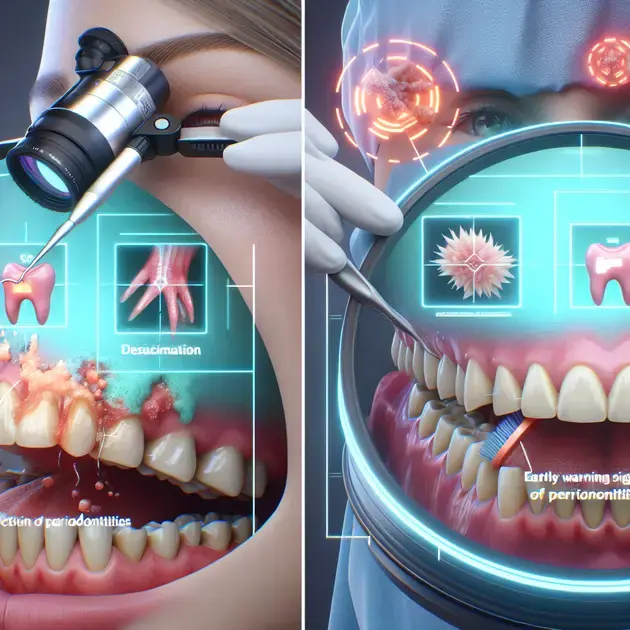Periodontitis, also known as gum disease, is a common condition that causes inflammation of the gums and can lead to serious health issues if left untreated. In this comprehensive medication guide, we will explore everything you need to know about managing periodontitis through medication.
With advancements in dental research and treatment options, there are now various medications available to help control the symptoms of periodontitis and prevent further progression of the disease. Understanding how these medications work and when to use them is crucial in maintaining good oral health and preventing complications associated with periodontitis.

Understanding Periodontitis Medication
Understanding the medications used to treat periodontitis is essential for effectively managing this condition. Periodontitis medications aim to reduce inflammation, control bacterial growth, and promote healing of the gums and supporting structures of the teeth. These medications can be prescribed in various forms, including mouth rinses, gels, antibiotics, and systemic medications.
One helpful resource to learn more about periodontitis medications is the website of the American Academy of Periodontology (AAP). On the AAP website, you can find detailed information about different types of medications commonly used in the treatment of periodontitis. The site also provides insights into the mechanisms of action of these medications and their potential side effects.
When considering periodontitis medications, it is crucial to consult with a dental professional who can assess your specific condition and recommend the most appropriate treatment plan. Your dentist or periodontist can provide guidance on the best medications for your individual needs and ensure you are using them correctly to achieve optimal results.
By educating yourself about periodontitis medications and working closely with your dental provider, you can effectively manage the symptoms of this condition and improve the health of your gums and teeth.
Types of Medications for Periodontitis Treatment
There are several types of medications commonly used in the treatment of periodontitis, each serving a specific purpose in addressing the underlying causes of the condition. Some of the main types of medications for periodontitis include antibiotics, antimicrobial mouth rinses, and enzyme suppressants.
To learn more about the different types of medications for periodontitis treatment, you can visit the website of the National Institute of Dental and Craniofacial Research (NIDCR). The NIDCR website offers valuable information on the various medications used in periodontal therapy, including their indications and potential side effects.
When using antibiotics or other medications for periodontitis, it is essential to follow your dental provider’s instructions carefully. Be sure to complete the full course of medication as prescribed, even if your symptoms improve before finishing the treatment. This will help prevent the development of antibiotic resistance and ensure the effectiveness of the medication.
By understanding the different types of medications available for periodontitis treatment and following your dentist’s recommendations, you can effectively address the underlying causes of the condition and promote long-term periodontal health.
Tips for Using Periodontitis Medications
When using medications to treat periodontitis, there are several essential tips to keep in mind to optimize their effectiveness and minimize potential side effects. It’s crucial to follow your dentist’s instructions carefully and maintain good oral hygiene practices to support the medication’s benefits.
One helpful resource for tips on using periodontitis medications is the website of the Centers for Disease Control and Prevention (CDC). The CDC website offers guidance on proper medication use, including dosage instructions, potential interactions with other drugs, and tips for avoiding common medication errors.
As you incorporate medications into your periodontal treatment regimen, be sure to attend regular follow-up appointments with your dental provider. These visits allow your dentist to monitor your progress, adjust your treatment plan as needed, and address any concerns or questions you may have about your medications.
In addition to taking your medications as directed, maintaining a healthy lifestyle can also support the success of your periodontal treatment. Eating a balanced diet, avoiding tobacco use, and managing stress can all contribute to better oral health and improve the effectiveness of your medications.

Key Considerations When Using Periodontitis Medications
When it comes to treating periodontitis, medications can play a crucial role in managing the condition. However, there are several key considerations that patients need to keep in mind when using these medications. One important factor is understanding the type of medication prescribed and following the dosage instructions carefully. It’s essential to communicate any existing health conditions or allergies to your dentist or periodontist to ensure the medication is safe for you.
Another consideration is the potential side effects of periodontitis medications. While these medications are effective in combating the bacteria that cause gum disease, they can also lead to adverse reactions in some individuals. It’s important to be aware of the common side effects and contact your healthcare provider if you experience any unusual symptoms while taking the medication.
Monitoring your progress is also crucial when using periodontitis medications. Regular dental check-ups and evaluations will help your healthcare provider assess the effectiveness of the treatment and make any necessary adjustments. Additionally, it’s important to maintain good oral hygiene practices, such as brushing and flossing regularly, to support the medication’s effectiveness.
Compliance with the prescribed treatment plan is another key consideration. Missing doses or stopping the medication prematurely can reduce its effectiveness and lead to worsening of the condition. It’s essential to follow the treatment plan outlined by your healthcare provider and communicate any difficulties or concerns you may have.
Overall, taking periodontitis medications requires careful consideration and proactive communication with your healthcare provider. By understanding the medication, monitoring your progress, and complying with the treatment plan, you can effectively manage the symptoms of gum disease and improve your oral health.
Understanding the Role of Antibiotics in Periodontitis Treatment
Antibiotics are commonly used in the treatment of periodontitis to combat the bacteria causing gum disease. Understanding the role of antibiotics in this treatment is essential for patients seeking to improve their oral health. Antibiotics work by targeting and eliminating the harmful bacteria in the gums, helping to reduce inflammation and prevent further damage to the teeth and supporting tissues.
It’s important to note that antibiotics are typically prescribed as part of a comprehensive treatment plan that includes professional dental cleanings, proper oral hygiene practices, and lifestyle modifications. Taking antibiotics alone may not provide long-term benefits if other aspects of oral health are neglected. Patients should follow their healthcare provider’s instructions carefully and complete the full course of antibiotics as prescribed.
One key consideration when using antibiotics for periodontitis treatment is the development of antibiotic resistance. Overuse or misuse of antibiotics can lead to bacteria becoming resistant to the medication, making future treatments less effective. Patients should only take antibiotics when prescribed by a healthcare professional and avoid self-medicating with leftover antibiotics.
Monitoring for any side effects or allergic reactions is also important when using antibiotics. Some individuals may experience gastrointestinal issues, allergic skin reactions, or other adverse effects when taking antibiotics. Patients should report any unusual symptoms to their healthcare provider promptly to avoid complications.
In conclusion, understanding the role of antibiotics in periodontitis treatment involves knowing how they work, following the prescribed treatment plan, being aware of the risks of antibiotic resistance, and monitoring for any adverse effects. By working closely with your healthcare provider and maintaining good oral hygiene practices, you can effectively incorporate antibiotics into your periodontal treatment regimen.
The Impact of Early Detection on Periodontitis Medication Success
Early detection of periodontitis plays a significant role in the success of medication-based treatment. Identifying gum disease in its initial stages allows for timely intervention and can help prevent the condition from progressing to more advanced stages. Patients who seek regular dental check-ups and report any unusual symptoms or changes in their oral health are more likely to benefit from early detection.
When periodontitis is detected early, medications can be prescribed to target the underlying cause of the disease and prevent further damage to the gums and teeth. Antibiotics, antiseptic mouthwashes, and other medications may be recommended as part of a comprehensive treatment plan to control the infection and inflammation in the gums.
Early detection also allows for personalized treatment plans to be developed based on the individual’s specific needs and oral health status. Patients who are proactive in seeking dental care and maintaining good oral hygiene practices are more likely to experience positive outcomes with periodontitis medications.
Furthermore, early detection of periodontitis can help patients avoid potentially more invasive and costly treatments in the future. By addressing gum disease in its early stages, patients can often achieve better outcomes with less extensive interventions, such as periodontal surgery or tooth extractions.
In summary, the impact of early detection on periodontitis medication success cannot be overstated. By recognizing the signs of gum disease early, seeking timely treatment, and following the prescribed medication regimen, patients can improve their oral health outcomes and prevent the progression of periodontitis to more severe stages. Early intervention is key to effectively managing gum disease and maintaining a healthy smile.
Conclusion
When considering the use of medications for periodontitis, it’s crucial to be well-informed about the prescribed medication, adhere to dosage instructions, and communicate any health conditions or allergies to your healthcare provider. Understanding the potential side effects, monitoring progress through regular check-ups, and maintaining good oral hygiene are key to effectively managing gum disease. Compliance with the treatment plan is essential to maximize the medication’s benefits and prevent worsening of the condition.
Antibiotics play a significant role in combating the bacteria responsible for gum disease, but they should be part of a comprehensive treatment plan that includes dental cleanings and proper oral care. Awareness of antibiotic resistance, following prescribed instructions, and promptly reporting any adverse effects are essential for successful treatment. By working closely with healthcare providers and emphasizing good oral hygiene practices, patients can integrate antibiotics effectively into their periodontal treatment.
Early detection of periodontitis is paramount for successful medication-based treatment. Timely identification allows for targeted interventions, personalized treatment plans, and prevention of advanced disease stages. By addressing gum disease in its early stages, patients can achieve better outcomes, avoid invasive procedures, and maintain a healthy smile. Recognizing the signs early, seeking prompt treatment, and adhering to medication regimens are crucial steps in managing gum disease effectively and preserving oral health.



